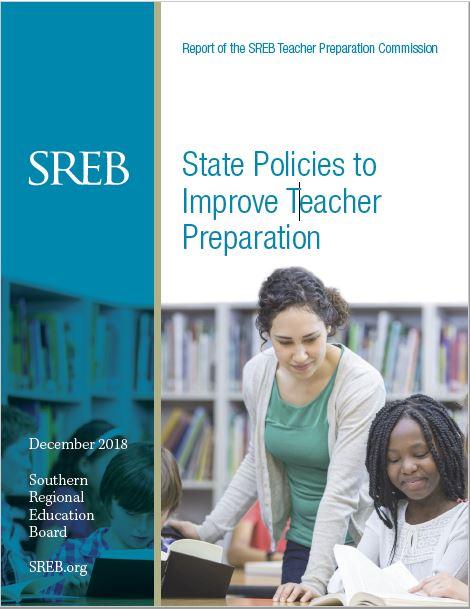Commission Recommends State Policies to Improve Teacher Preparation
SREB will help states consider recommendations on licensure, clinical experience, data and partnerships.
To improve the readiness of new teachers for the classroom, the SREB Teacher Preparation Commission is calling on leaders to hold all new teachers in a state to the same high standards for initial licensure, regardless of their path to the profession. The Commission recommends that states adopt practice-based assessments that allow teachers to demonstrate practical classroom skills to earn their teaching licenses.
The Commission also urges states to require high-quality clinical experiences during teacher training — plenty of classroom practice with targeted feedback from mentor-teachers. And it suggests that states play a role in helping colleges of education build close partnerships with local school districts.
Alongside changes in licensure and practice-teaching requirements, the Commission recommends that states act now to bring together data on teachers’ preparation and early careers to learn what works best to improve student learning.
Louisiana Governor John Bel Edwards chaired the Commission, whose members were state legislators, deans, university presidents, educators, researchers, heads of postsecondary systems, state and district superintendents, and leaders of nationwide organizations.
“A great teacher can change the trajectory of a student’s life,” said Governor Edwards, 2018-19 chair of the Southern Regional Education Board. “Given its importance, the profession should require a firm grounding in initial preparation, close mentoring in the early years, and continued professional learning.”
Read the report >
Recommendations of the SREB Teacher Preparation Commission
The Commission calls on leaders to come together within their states to decide how to put these recommendations into action at home.
- Hold all new teachers in a state to the same high criteria for their initial license, no matter their route to the profession. Require them to demonstrate mastery of classroom skills through practice-based licensure tests.
- Require high-quality clinical teaching experiences, with clear expectations and strong mentor-teachers.
- Develop comprehensive statewide data systems for continuous improvement.
- Encourage strong partnerships between teacher preparation programs and K-12 districts.
Clear and cohesive expectations across the early career
 The ultimate goal should be clear
and aligned expectations, from a teacher candidate’s formal
preparation through licensure and on to continued effectiveness
in the classroom. The Commission recommends that each state
require a system of tiered professional licensure and pair it
with induction, mentoring and professional development for the
first three years of a teacher’s career.
The ultimate goal should be clear
and aligned expectations, from a teacher candidate’s formal
preparation through licensure and on to continued effectiveness
in the classroom. The Commission recommends that each state
require a system of tiered professional licensure and pair it
with induction, mentoring and professional development for the
first three years of a teacher’s career.
“As they came together to confront one of education’s most
challenging issues, members of the Commission stressed that
although there are no easy answers, action has never been more
important,” says the report. “They debated how to raise
standards for teacher preparation without aggravating teacher
shortages some states are experiencing. In the end, they agreed
that filling vacancies with people who cannot help students learn
is not a solution and acted to raise expectations while allowing
time to meet them.”
SREB support for state implementation
“The job of teaching is harder than ever, and every teacher
deserves effective preparation for the classroom,” said SREB
President Stephen Pruitt. “It will be a priority for us at SREB
to help elected officials and education leaders use these
recommendations in their own states.”
SREB is already working to help states convene key leaders to
consider the recommendations, beginning with a roundtable in
North Carolina. SREB will also host webinars and
publish briefings on related topics.
The Commission and its reports >
State-by-state
The report features promising practices in each of the recommendation areas. It details for each of the 16 SREB states:
- minimum requirements for initial teacher licensure, including for assessments and clinical experience
- types and classes of licenses and certificates, and approved alternative routes to licensure
- enrollment in teacher preparation programs by type (traditional or alternative)
The Southern Regional Education Board is an interstate compact created in 1948 by Southern governors and legislators. A nonprofit, nonpartisan organization based in Atlanta, SREB works cooperatively with state leaders and educators to improve education from pre-K through Ph.D. SREB states are Alabama, Arkansas, Delaware, Florida, Georgia, Kentucky, Louisiana, Maryland, Mississippi, North Carolina, Oklahoma, South Carolina, Tennessee, Texas, Virginia and West Virginia.

